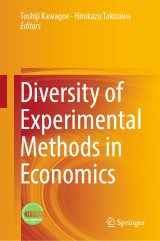Details

Diversity of Experimental Methods in Economics
|
106,99 € |
|
| Verlag: | Springer |
| Format: | |
| Veröffentl.: | 09.02.2019 |
| ISBN/EAN: | 9789811360657 |
| Sprache: | englisch |
Dieses eBook enthält ein Wasserzeichen.
Beschreibungen
<p></p><p>This is the first book that examines the diverse range of experimental methods currently being used in the social sciences, gathering contributions by working economists engaged in experimentation, as well as by a political scientist, psychologists and philosophers of the social sciences. Until the mid-twentieth century, most economists believed that experiments in the economic sciences were impossible. But that’s hardly the case today, as evinced by the fact that Vernon Smith, an experimental economist, and Daniel Kahneman, a behavioral economist, won the Nobel Prize in Economics in 2002. </p>However, the current use of experimental methods in economics is more diverse than is usually assumed. As the concept of experimentation underwent considerable abstraction throughout the twentieth century, the areas of the social sciences in which experiments are applied are expanding, creating renewed interest in, and multifaceted debates on, the way experimental methods are used. <p></p><p> </p><p>This book sheds new light on the diversity of experimental methodologies used in the social sciences. The topics covered include historical insights into the evolution of experimental methods; the necessary “performativity” of experiments, i.e., the dynamic interaction with the social contexts in which they are embedded; the application of causal inferences in the social sciences; a comparison of laboratory, field, and natural experiments; and the recent use of randomized controlled trials (RCTs) in development economics. Several chapters also deal with the latest heated debates, such as those concerning the use of the random lottery method in laboratory experiments. </p><p></p>
<div>The performativity of economic experiments.- The use of experiments in economics and psychology: Historical perspective.- Controlled laboratory experiment in economics and induced value theory.- Experimental methods in behavioral game theory.- Statistical causal inference and the concept of causality.- RCT method in development economics.- Natural experiment and randomization in mechanism design.- The significance of simulation method in economics.</div>
<div>Toshiji Kawagoe, Future University Hakodate</div><div><br></div><div>Hirokazu Takizawa, Chuo University</div>
<p></p><p>This is the first book that examines the diverse range of experimental methods currently being used in the social sciences, gathering contributions by working economists engaged in experimentation, as well as by a political scientist, psychologists and philosophers of the social sciences. Until the mid-twentieth century, most economists believed that experiments in the economic sciences were impossible. But that’s hardly the case today, as evinced by the fact that Vernon Smith, an experimental economist, and Daniel Kahneman, a behavioral economist, won the Nobel Prize in Economics in 2002. </p>
However, the current use of experimental methods in economics is more diverse than is usually assumed. As the concept of experimentation underwent considerable abstraction throughout the twentieth century, the areas of the social sciences in which experiments are applied are expanding, creating renewed interest in, and multifaceted debates on, the way experimental methods are used.<p></p>
<p>This book sheds new light on the diversity of experimental methodologies used in the social sciences. The topics covered include historical insights into the evolution of experimental methods; the necessary “performativity” of experiments, i.e., the dynamic interaction with the social contexts in which they are embedded; the application of causal inferences in the social sciences; a comparison of laboratory, field, and natural experiments; and the recent use of randomized controlled trials (RCTs) in development economics. Several chapters also deal with the latest heated debates, such as those concerning the use of the random lottery method in laboratory experiments.</p><p></p>
However, the current use of experimental methods in economics is more diverse than is usually assumed. As the concept of experimentation underwent considerable abstraction throughout the twentieth century, the areas of the social sciences in which experiments are applied are expanding, creating renewed interest in, and multifaceted debates on, the way experimental methods are used.<p></p>
<p>This book sheds new light on the diversity of experimental methodologies used in the social sciences. The topics covered include historical insights into the evolution of experimental methods; the necessary “performativity” of experiments, i.e., the dynamic interaction with the social contexts in which they are embedded; the application of causal inferences in the social sciences; a comparison of laboratory, field, and natural experiments; and the recent use of randomized controlled trials (RCTs) in development economics. Several chapters also deal with the latest heated debates, such as those concerning the use of the random lottery method in laboratory experiments.</p><p></p>
Provides readers with an overview of the various experimental approaches used in modern economics Helps experimental economists as well as behavioral economists rethink their methodology Stimulates further inquiry into the experimental method for philosophers of the social sciences


















